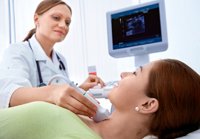Think You Understand Your T3 or Triiodothyronine Levels? Think Again…
Polycystic Ovarian Syndrome (PCOS) is one of the most disruptive hormone disorders a woman can develop since it produces an imbalance in reproductive hormones. Although both men and women possess estrogen, testosterone, and progesterone, testosterone is called a male sex hormone because men have more of it. When a woman’s body begins to produce too many androgens (male hormones), it can undergo a series of changes that manifest as a variety of very uncomfortable and embarrassing symptoms. But Polycystic Ovary Syndrome (PCOS) can do more than alter the natural reproductive cycle of a woman’s body—it can produce other hormonal imbalances, including changes in levels of thyroid hormones (such as triiodothyronine, known as T3) that can inflict significant changes in the body.6 The good news is there is a natural solution. Lifestyle changes that include a healthy diet, regular exercise, and targeted nutritional supplements can help if you’re battling PCOS.
Causes
Thyroid Hormones and the Significance of T3
A small, butterfly-shaped gland in the  neck, the thyroid is a gland that produces the hormones necessary to carry out many of the body’s most important functions.4 The thyroid works like this:1
neck, the thyroid is a gland that produces the hormones necessary to carry out many of the body’s most important functions.4 The thyroid works like this:1
- The hypothalamus secretes Thyrotropin-releasing Hormone (TRH).
- TRH signals the pituitary to release Thyroid Stimulating Hormone (TSH).
- TSH triggers the production and release of triiodothyronine (T3) and thyroxine (T4) in the thyroid.
- T3 and T4 travel through the bloodstream and serve a variety of functions.
Although this chain of events seems straightforward, the production of triiodothyronine (T3) is very unique. The thyroid is the only part of the body that is capable of utilizing iodine. Found in many foods and iodized salt, iodine is absorbed by the thyroid and then attached to molecules of tyrosine when it receives the signal from TSH. To create T3, tyrosine is connected to three iodine molecules; to create T4, tyrosine is connected to four iodine molecules.2
Although only 20 percent of the hormones produced by the thyroid are T3, T4 transforms into T3 at various stops throughout the bloodstream. This is important because  together these hormones accomplish a great deal, including:3
together these hormones accomplish a great deal, including:3
- The dissolution of fats, protein, and carbohydrates
- The regulation of metabolism
- The production of body heat
- The maintenance of heart and respiratory rates
- The toning of muscles
How Are T3 and PCOS Related?
Thyroid disorders and Polycystic Ovarian Syndrome (PCOS) share several common symptoms. In fact, the two can appear to be so similar that thyroid disorders are often ruled out during the diagnostic process. Because the symptoms associated with Polycystic Ovarian Syndrome (PCOS) are variable and occur in different degrees of severity from one woman to the next, health-care professionals have yet to devise a set of diagnostic criteria and often work toward a diagnosis of this disorder by ruling out other possible conditions. Again, a few of the common symptoms include: irregular menstrual periods, hair loss, weight gain, and exhaustion.
Additionally, women who have already been confirmed as having Polycystic Ovarian Syndrome (PCOS) should be aware of their T3 levels and general thyroid health because this condition puts them at a higher risk for developing other health problems. In addition to thyroid disorders, women with Polycystic Ovarian Syndrome (PCOS) are also at greater risk of developing heart disease, Metabolic Syndrome (Syndrome X), obesity, diabetes, pre-diabetes, and endometrial and breast cancer.
It is clear, then, that maintaining an understanding of one’s thyroid health and T3 levels is important.
Symptoms
How Does PCOS Change a Woman’s Body?
With elevated male hormones, you can often experience physical changes that reflect a more masculine appearance. Not only do these hormones alter your skin and hair, they interfere with normal reproductive functions and can get in the way of the dream of becoming a mother and maintaining a firm identity as a female in today’s society. Needless to say, these symptoms can be both physically and emotionally damaging.
Women who have Polycystic Ovarian Syndrome (PCOS) develop their own unique combination of symptoms, making it difficult for doctors to provide a PCOS diagnosis. Some of these symptoms include:5
- Polycystic Ovaries:? Although ovarian cysts are the namesake of Polycystic Ovarian Syndrome (PCOS), not all women who have PCOS develop them.
- Infertility:? Easily one of the most distressing ordeals a woman can go through, infertility can crush the dream of becoming a parent and can create tension in relationships. Also, depending on a woman’s identity and her goals in life, the inability to conceive a child can produce distressing emotional symptoms.
 Depression and Anxiety:? Given the sensitive nature of many of the PCOS symptoms that women have to deal with, depression and anxiety can naturally occur due to the stresses of the condition and/or be caused by hormonal imbalances.
Depression and Anxiety:? Given the sensitive nature of many of the PCOS symptoms that women have to deal with, depression and anxiety can naturally occur due to the stresses of the condition and/or be caused by hormonal imbalances.- Anovulation:? This lack of ovulation is often the cause of infertility.
- Hirsutism:? Excess growth of hair in abnormal and embarrassing places, such as the face, chest, and back. This symptom is one of the most noticeable.
- Hair Loss:? Often following the blueprint of male pattern baldness, the thinning or loss of hair is another noticeable and stress-inducing symptom.
- Exhaustion: ? Results from the inability of the body to use insulin to turn blood sugar into energy.
- Weight Gain or Obesity:? Caused by several factors, women with Polycystic Ovarian Syndrome (PCOS) often gain weight (although thin women can develop PCOS).
- Skin Conditions:? Issues such as acne, dandruff, dry skin, skin tags, and acanthosis nigricans (dark, thick patches of skin) are noticeable symptoms that can cause pain and self-consciousness.
- High Blood Pressure and High Cholesterol:? Serious on their own, these two symptoms are even more worrisome for women with PCOS because they are at a higher risk for heart disease, stroke, and heart attack.
- Issues Sleeping:? Many women with PCOS report sleep apnea, insomnia, and snoring. These issues can lead to chronic fatigue and a difficulty maintaining mental focus.
- Pelvic Pain:? Pain in the abdomen and pelvic region is common.
Often a result of Insulin Resistance (IR), Polycystic Ovarian Syndrome (PCOS) is commonly the product of another hormonal insensitivity. IR occurs when the hormone insulin is not able to enter cells to convert blood sugar into energy. This results in both excess insulin and glucose roaming the bloodstream. The glucose particles are large enough that they are able to actually damage arterial walls, causing nooks in which plaque can be caught and atherosclerosis can begin (which is one of the reasons why women with this condition are more prone to developing heart disease). It is clear, then, how hormones of the body can affect one another, and also how the hormones of the thyroid can be easily pulled into this group of imbalances.
Treatment Options
What to Do When T3 Levels Change
 Thyroid disorders can be treated by modern medicine. Depending on the nature of the disorder, and the way in which hormone levels have changed, various medications and hormone therapies are available if you discover your thyroid isn’t working properly. These treatments might also help with PCOS. According to a study by the University of Pavia in Italy, “These results indicate that metformin treatment [diabetes medication] has a TSH-lowering effect in hypothyroid patients with PCOS, both treated with l-thyroxine and untreated.”7
Thyroid disorders can be treated by modern medicine. Depending on the nature of the disorder, and the way in which hormone levels have changed, various medications and hormone therapies are available if you discover your thyroid isn’t working properly. These treatments might also help with PCOS. According to a study by the University of Pavia in Italy, “These results indicate that metformin treatment [diabetes medication] has a TSH-lowering effect in hypothyroid patients with PCOS, both treated with l-thyroxine and untreated.”7
If thyroid issues are a symptom of Polycystic Ovarian Syndrome (PCOS), though, recovery is not always so simple. Health-care professionals and researchers have yet to create a single medical treatment for this condition; however, it has been controlled by many women who commit to major lifestyle changes and address one of its underlying causes: Insulin Resistance.
Natural Therapies
Battling PCOS… Naturally
If you have PCOS, then you can try to reverse one of it its underlying causes, Insulin Resistance, naturally. First, there are a few steps you need to address….
 Create a meal plan that incorporates foods that spark the least amount of insulin. Foods that are low on the glycemic index and high in fiber are perfect. Likewise, foods that are high in sugars or simple carbohydrates should be avoided. This can be difficult if you enjoy sweet snacks or starchy foods, like pasta.
Create a meal plan that incorporates foods that spark the least amount of insulin. Foods that are low on the glycemic index and high in fiber are perfect. Likewise, foods that are high in sugars or simple carbohydrates should be avoided. This can be difficult if you enjoy sweet snacks or starchy foods, like pasta.- Get started with a new workout routine. Because Polycystic Ovarian Syndrome (PCOS) can create many physical limitations, this exercise schedule will vary largely based on your physical capabilities. As long as you get as much exercise as you can, and challenge your body without causing injury, you’ll begin to see and feel a difference.
- Reach out to other women who have this disorder. By networking with others who are facing the same challenges you are, you can lean upon each other and provide much needed support.
- Use targeted nutritional supplements, special blends of vitamins, minerals, and botanicals that can naturally help your body fight back and give it the ability it needs to regain its health.
Recovering from Polycystic Ovarian Syndrome (PCOS) and learning to understand T3 levels can be a tough road. But with the right education and a positive attitude, as well as resources and support, you have the ability to regain control over you life and reinstate your health.
Read more articles about PCOS and Hormones
Learn more about the Insulite PCOS 5-Element Solution
Next Steps
- Take the PCOS Quiz! Get your score and assess your hormone health risks.
- Join our Facebook Sisterhood Group Pose your questions to this group of like-minded women. Get the answers to your questions and the support you need.
- Checkout the Hormone Reset. Guided Practices to eliminate anxiety, lose weight and boost energy.
We are committed to helping women reverse their symptoms of hormone imbalance – a major cause of excess weight gain, adult acne, unwanted facial hair, depression, anxiety, and heartbreaking female infertility.
©Insulite Health empowers women with hormone imbalance to transform their lives through a process of healing with the Natural Hormone Solution –a complete solution for helping women reverse the symptoms hormone imbalance..


 Depression and Anxiety:? Given the sensitive nature of many of the PCOS symptoms that women have to deal with, depression and anxiety can naturally occur due to the stresses of the condition and/or be caused by hormonal imbalances.
Depression and Anxiety:? Given the sensitive nature of many of the PCOS symptoms that women have to deal with, depression and anxiety can naturally occur due to the stresses of the condition and/or be caused by hormonal imbalances. Create a meal plan that incorporates foods that spark the least amount of insulin. Foods that are low on the glycemic index and high in fiber are perfect. Likewise, foods that are high in sugars or simple carbohydrates should be avoided. This can be difficult if you enjoy sweet snacks or starchy foods, like pasta.
Create a meal plan that incorporates foods that spark the least amount of insulin. Foods that are low on the glycemic index and high in fiber are perfect. Likewise, foods that are high in sugars or simple carbohydrates should be avoided. This can be difficult if you enjoy sweet snacks or starchy foods, like pasta.